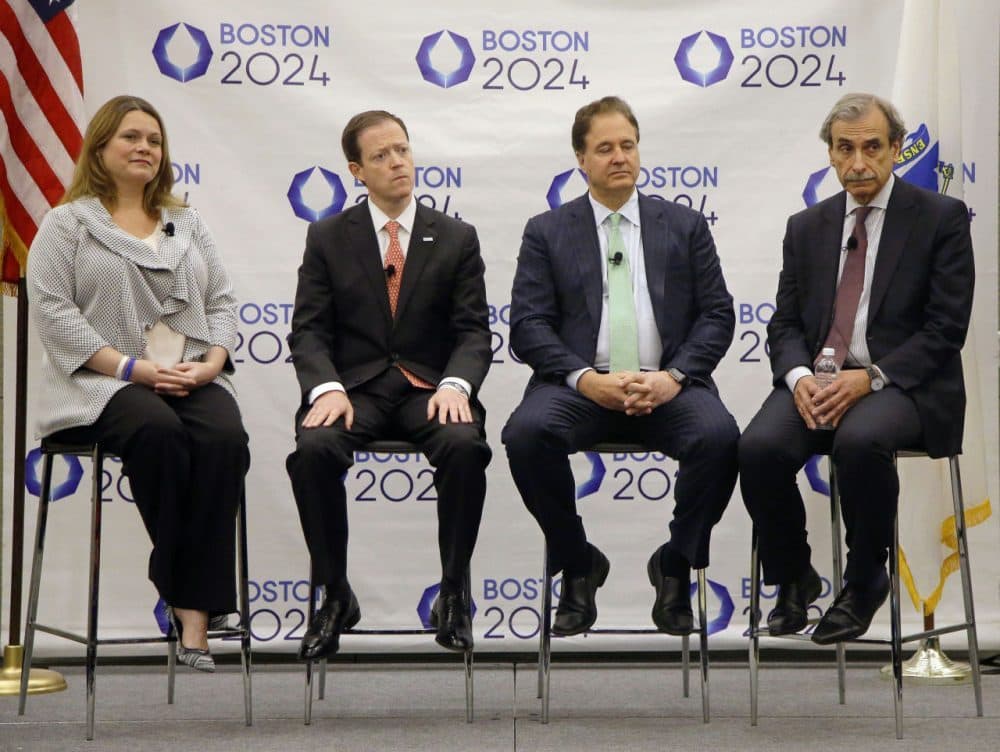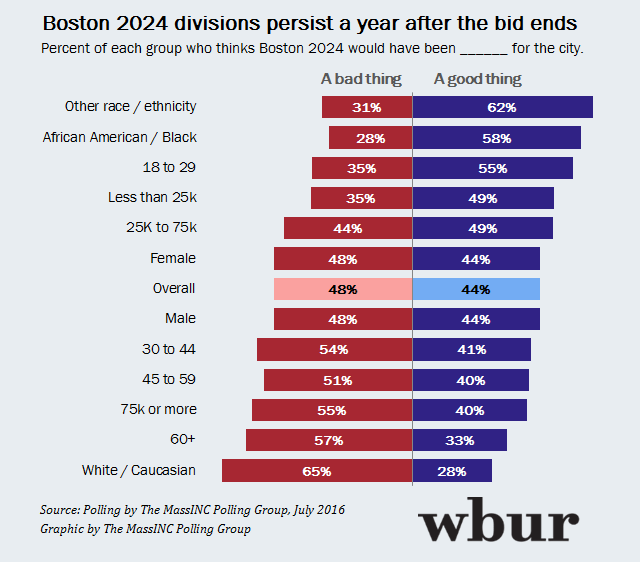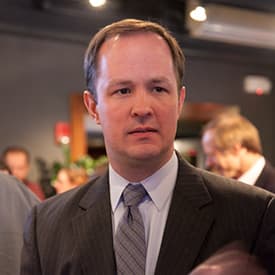Advertisement
Analysis: A Year Later, No Regrets On Boston 2024

This week marks the one-year anniversary of the end of Boston 2024, the ill-fated push to bring the Summer Olympics to Boston. The bid ultimately failed largely due to the lack of public support.
One year later, the public seems not to be regretting its earlier lukewarm reception.
According to a new poll of Boston residents by The MassINC Polling Group, 44 percent think the Boston Olympics would have been a good thing for the city, but slightly more (48 percent) disagreed. The figures are identical to the 44-48 split from our last poll for WBUR on the issue, taken last July, just before the United States Olympic Committee's decision to end the bid.
Public opinion is part of the International Olympic Committee’s criteria for choosing a host city, and tepid and immovable public support eventually ground the bid to dust.

The intervening year has apparently done little to change minds of whether the 2024 Olympics would have been good for the city. Digging into the poll’s demographics shows the same groups of people still wish Boston had held on, and the same people are glad the Olympics are gone. Young people and nonwhite voters, both among the biggest proponents for the bid, hold the most regrets. On the other hand, just 28 percent of white voters think the Olympics would have been good for the city.
Is Boston The City Of 'No'? Not Really
In the year since the end of Boston 2024, observers have pointed to the failed bid, and the aborted IndyCar race in the Seaport District, as evidence of a “can’t do” attitude in the city. Boston boosters worry that the city is getting a reputation as a city of no, somewhere where it’s simply too hard to get things done.
But the durability of opinion on the Olympics suggests a more complicated story. The Summer Games and the Indy race were both disruptive, one-time sporting events, but the reasons they failed are quite different. IndyCar ran off-course in the midst of Boston’s bewildering permitting and political environment; the Olympics bid ended mostly because voters just weren’t into it. There was no one moment when everything went wrong for Boston 2024; there just was never a moment when most things were going right.
In the aftermath, political and business leaders hastened to take credit for their fiduciary caution on the Olympics. But there is little question that public support was the main issue.
USOC CEO Scott Blackmun put it this way in a statement: “Notwithstanding the promise of the original vision for the bid, and the soundness of the plan developed under [Boston 2024 Chair] Steve Pagliuca, we have not been able to get a majority of the citizens of Boston to support hosting the 2024 Olympic and Paralympic Games. Therefore, the USOC does not think that the level of support enjoyed by Boston’s bid would allow it to prevail over great bids from Paris, Rome, Hamburg, Budapest, or Toronto.”
Sure, there were reasons to be skeptical of the rosy financial projections. But voters were way ahead of their elected leaders in their apprehension, believing from the beginning that taxpayer funds would be needed. The more organizers denied it, the more convinced voters became. By the time USOC pulled the plug, 73 percent of the city’s residents were convinced taxpayer funds would be needed.
Taken together, IndyCar and the Olympics may create the impression that Boston is a city of no, but each event came apart of its own set of forces.
Los Angeles Embraces The Games
After parting ways with Boston, the USOC turned to Los Angeles, which had been a runner-up to Boston in the initial competition and which, famously, hosted the games in 1984.
Unlike Boston, where WBUR started polling the idea as soon as the bid was announced, it was months before we had a read on whether Angelinos wanted to host the Games again. It turns out they do; 80 percent or more of the city’s residents favor the bid. That sort of number is much more like what the IOC is looking for when evaluating public support for hosting the games.
It’s tempting to think Boston 2024 might have gotten its feet under itself if it had had a similar head start on the public polling. But even the internal polling commissioned by Boston 2024 showed tepid support. Bostonians were just never into the idea. Note to would-be Boston 2032 dreamers (if they exist): They still aren’t.
These results are based on a survey of 301 residents of the city of Boston. Interviews were conducted July 12-13 by live telephone interviews via both landline and cellphone. The margin of sampling error is +/- 5.7 percentage points with a 95 percent level of confidence.
